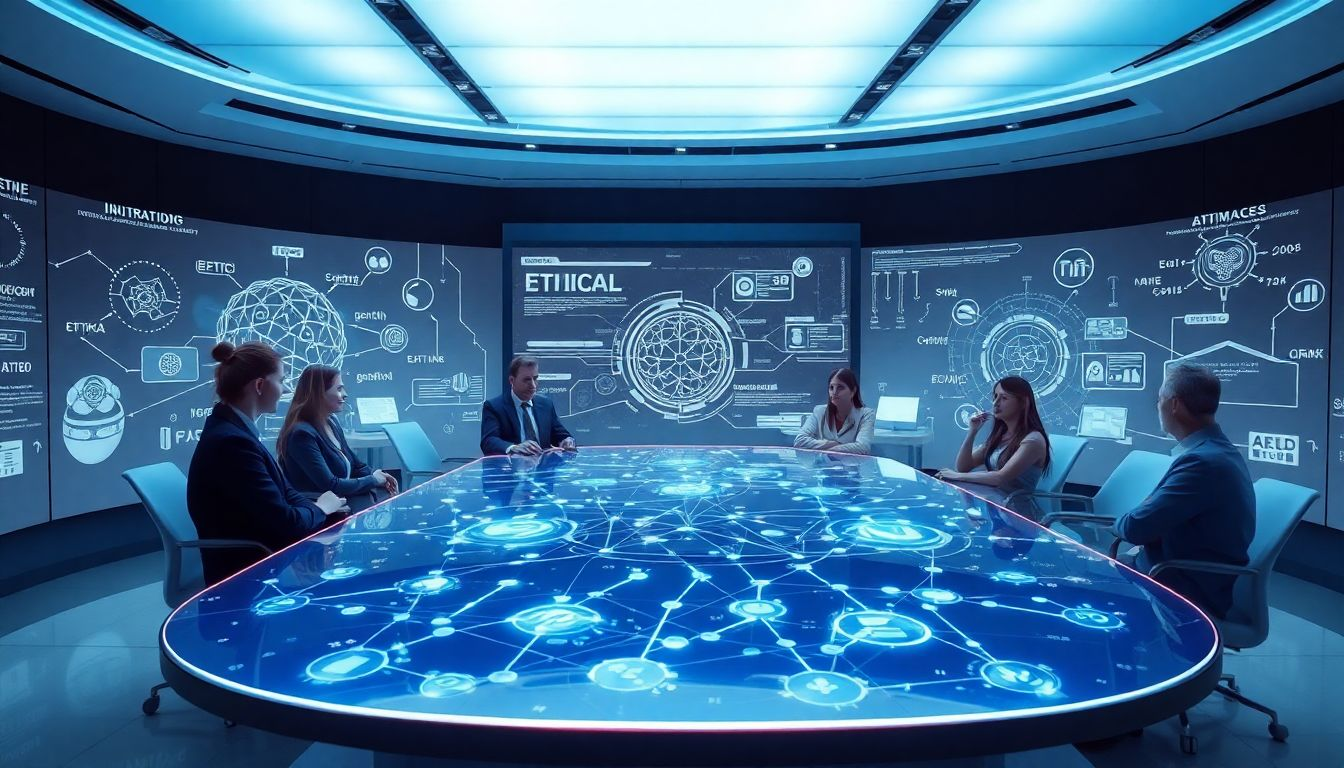
Best Free AI Tools for Beginners in 2025
Discover the top free AI tools for beginners in 2025, perfect for those just starting their AI journey.
Read More →DNavigate the complex world of AI with our comprehensive guide to AI ethics and responsible development in 2025. Explore key principles like transparency, fairness, and accountability, and learn how developers and organizations are shaping trustworthy AI systems. This blog offers actionable insights for tech professionals, policymakers, and enthusiasts to ensure AI advancements benefit society while minimizing risks and ethical challenges.

Artificial intelligence surrounds us now. From smartphones and computers to driverless cars, AI is influencing the way we work and live. As AI becomes increasingly sophisticated, there's a question we must ask ourselves: are we creating it responsibly? If we don't plan carefully, AI might do more harm than good. This is why AI ethics is no longer a buzzword—it's essential for developers, businesses, and governments. This book will guide you through the essential principles, greatest challenges, legal requirements, and best practices for building AI safely and ethically.
AI ethics is about making choices regarding the way AI should be developed and deployed. It's about guaranteeing technology serves the greater good without harming. Simply put, it's asking, "What is wrong or right when designing intelligent machines?" The aim is to lead us towards equitable, transparent, and accountable AI systems that honor human rights.
AI is applied in numerous fields—health, recruitment, law enforcement, and so forth. Research indicates that more than 70% of businesses incorporate AI in some capacity. However, with this fast-paced adoption come threats such as discriminatory algorithms or data breaches. Facial recognition software, for instance, has been shown to misclassify women and minorities at a higher rate. These problems demonstrate why ethics is important. If we don't address ethical issues, then we risk losing the public's trust and causing actual damage.
Some simple rules can lead to responsible AI:
By adhering to these principles, we can develop AI systems that benefit everyone, not just a few.
Bias is one of AI's greatest challenges. Bias may result from biased data used for training or defective model design. For example, a criminal justice system employed an algorithm named COMPAS that incorrectly labeled Black suspects at a higher rate than white suspects. Facial recognition software also has trouble with people of color. Unless we correct these biases, AI can exacerbate social divisions instead of bridging them.
AI tends to need大量 data gathering, which raises privacy concerns. Sensitive details such as health records or private surfing activities might be misused or leaked. Laws such as GDPR in Europe and CCPA in California establish guidelines to safeguard users' data privacy. Nevertheless, certain companies disregard these legislations, facing fines and loss of credibility. Ethical developers put data security first and obtain user permission at every possible step.
Who is responsible when AI gets things wrong? Is it the programmer, the firm, or the government? These are difficult questions because AI systems can behave randomly. Establishing clear lines of accountability is crucial. Without it, whenever there is a fault, nobody takes the blame, and trust is destroyed.
AI must be reliable. But bugs or unforeseen behavior can lead to accidents—such as a runaway drone or a defective robot. Thorough testing and verification minimize these risks. Engineers need to foretell potential failure and incorporate safety nets into all systems.
Regulations today influence the development of AI globally. The European Union's AI Act is a move towards transparent rules for reliable AI. Regulations such as GDPR and CCPA impose stringent data privacy regulations. Nations are developing laws to guarantee AI stays safe and unbiased.
Organizations such as IEEE and the Partnership on AI have issued ethical guidelines to promote responsible AI. These principles include beneficence, non-maleficence, and respect for human rights. Adhering to these standards ensures AI remains in accordance with society's norms.
Firms are establishing ethics committees to govern AI initiatives. They establish internal guidelines to ensure responsible design and deployment. Audits and diversity efforts reflect a firm's resolve for equitable and secure AI.
Begin with equity. Add bias detection capabilities and employ diverse training sets. Explainability tools make decisions traceable, instilling user trust. Make transparency and bias avoidance a priority throughout the development process.
Involve various voices—particularly from underrepresented communities—in AI development. Provide information openly to users and solicit input. Public engagement makes AI more trusted and responsive to societal needs.
AI does not stop at deployment. Ongoing audits catch ethical problems early. End-user feedback permits ongoing updates to resolve biases or weaknesses. Ethical AI needs constant attention, not a single effort.
Explainability advances make AI choices clearer. This is crucial in sensitive domains such as health care or legal sentencing. Ethical use of AI here can enhance performance and minimize mistakes.
AI can enforce ethical practices—identifying bias or unethical conduct in real-time. Developers are creating systems that include ethical reasoning as an integral part, so AI can adjudicate its actions by human moral standards.
International collaboration between nations, businesses, and scientists is needed. Global standards would prevent a quiltwork of contradictory regulations and ensure uniform AI safety worldwide.
Building AI responsibly isn't just about following rules. It's about earning society's trust and creating technology that uplifts everyone. Understanding key principles, confronting challenges head-on, and following clear standards help us develop AI wisely. Remember—by prioritizing transparency, fairness, privacy, and accountability, we're shaping a better future with technology that truly serves humanity. Let's commit to responsible innovation and keep ethics at the core of AI development.

Discover the top free AI tools for beginners in 2025, perfect for those just starting their AI journey.
Read More →
Discover the most impactful AI trends that are shaping the future of technology and business in 2025.
Read More →
Explore the most effective AI-powered tools that can help you work smarter and achieve more in less time.
Read More →